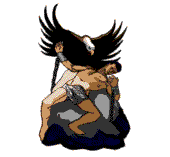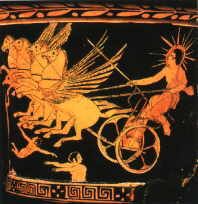 Directions: Read the following myth and then answer the reading questions that follow.Daedalus
Directions: Read the following myth and then answer the reading questions that follow.Daedalus
retold by Anne Terry WhiteIN the days when King Minos ruled Crete and his mighty navy ranged the seas, there lived in Athens a man by the name of Daedalus. And his name was known as far and wide as that of Minos. For Daedalus was the greatest architect and sculptor of his time. There was nothing his ingenious mind could not design or his skillful hands execute. And his statues were so real that people said they lived. It seemed that at any moment they might move a hand or take a step or open their ups and speak.
His young nephew, Talus, also had clever hands and a creative mind. So his mother placed him with her brother that the boy might learn his marvelous skills. But Talus had a genius of his own and even more imagination. Walking on the shore one day, he picked up the backbone of a fish. Idly he drew the strong, sharp spines forward and back across a piece of driftwood. They cut deep into the wood. He went home and notched a metal blade all along one edge—and he had a saw. Another time he fixed two iron rods together at the tip. He held one firmly upright against the earth and moved the other slowly around. It made a perfect circle—he had invented the compass.
Talus was a pupil to make any teacher excited and proud. But not Daedalus. Instead of being pleased, he was frightened and sorely jealous.
“Talus will soon surpass me!” he thought.
He could not bear the idea of a rival, and came to hate the boy. And one day, when they stood together on a height, Daedalus pushed Talus off to his death.
He had not planned the deed. It had been a sudden, crazy impulse. The next instant, horrified at what he had done, he rushed down to the boy. But it was too late. Talus was dead, and not all the wonderful skills of Daedalus could call him back. Clearly, if Daedalus wished to save his own life, he must flee. So he left Athens and wandered miserably from place to place, until at last he left Greece altogether and crossed the sea to Crete.
King Minos was delighted to have the Athenian in his realm. The King had something in mind that called for the genius of Daedalus. Minos possessed a fearful monster, with the head and shoulders of a bull and the legs and trunk of a man. The creature was called the Minotaur—that is, the Bull of Minos. The King wanted a suitable place to keep the Minotaur. The building must be such that neither the monster himself nor any victim sent In to be devoured by him could possibly escape from it.
So, at the King’s command, Daedalus designed the Labyrinth. The building was a bewildering maze of passages. They turned back upon themselves, crisscrossed, and went round and round without leading anywhere. Once inside the Labyrinth, it was all but impossible to find the way out again. Even Daedalus himself was once nearly lost.
King Minos was delighted with Daedalus’ work and held him in highest favor. Yet Daedalus was less than pleased, for he felt himself to be no better than a prisoner in Crete. The King was so afraid Daedalus would reveal the secret of the Labyrinth that he would not let him leave the island. And for that very reason Daedalus yearned to go. With what envy he watched the birds winging their way through the sky!
One day, as his eyes followed the graceful sea birds cleaving the ocean of air, an idea came to him.
“King Minos may shut my way out by land and by sea,” he thought, “but he does not control the air.”
And he began to study the flight of birds and to observe how wings are fashioned. He watched the little song birds fold and unfold their wings, watched how they rose from ground, flew down from the trees, and went to and fro. He also watched the herons slowly flapping their great wings. He watched the eagles soar and swoop. He saw, too, how their feathers overlapped one another—where they were large and where they were small.
When he thought he understood the secrets of flight, Daedalus went to a nesting place he knew of and gathered feathers of various sizes. And in a chamber close to the roof he began to build wings. First he laid down a row of the tiniest feathers, then a row of larger ones overlapping them, and yet larger ones beyond these. He fastened the feathers together in the middle with thread and at the bottom with wax. And when he had built on enough rows, he bent them around into a gentle curve to look like real birds’ wings.
His young son Icarus stood by and watched his father work. Laughing, the boy caught the feathers when they blew away In the wind. He pressed his thumb into the yellow wax to soften it for his father, hindering more than he helped.
When Daedalus had finished the pair of wings, he put them on. He raised himself in the air and hovered there. He moved the wings just as he had seen birds do, and lo! he could fly. Icarus clapped his hands together in delight.
“Make me a pair of wings, too, father!” he cried.
Then Daedalus made a second pair of wings and prepared his son to fly.
“Now I warn you, Icarus,” Daedalus said, “not to be reckless. Be wise, not bold. Take a course midway between heaven and earth. For if you fly too high, the sun will scorch your feathers. And if you fly too low, the sea will wet them. Take me for your guide. Follow me and you will be safe.”
All the time he was speaking, Daedalus was fastening the wings to his son’s shoulders. His hands trembled as he thought of the great adventure before them. At the same time, he was worried about the boy. He did not know whether he could quite trust Icarus to obey. As he adjusted his own wings and kissed the excited child, tears ran down Daedalus’ face.
“Remember,” he repeated for the last time. “Heed my words and stay close to me!”
Then he rose on his wings and flew from the housetop. Icarus followed.
Daedalus kept a watchful eye on the boy, even as a mother bird does when she has brought a fledgling out of its nest In the treetops and launched it in the air. It was early morning. Few people were about. But here and there a plowman in the field or a fisherman tending his nets caught sight of them.
"They must be gods!” the simple toilers cried, and they bent their bodies in reverent worship.
Father and son flew far out over the sea. Daedalus was no longer worried about Icarus, who managed his wings as easily as a bird. Already the islands of Delos and Paros were behind them. Calymne, rich in honey, was on their right hand. But now Icarus began to yield to the full delight of his new-found powers. He wanted to soar and swoop. How thrilling it was to rise to a height, close his wings, and speed down, down, like a thunderbolt, then turn and rise again!
Time after time Icarus tried it, each time daring greater heights. Then, forgetting his father’s warning, he soared higher still, far up into the cloudless sky.
“Not even the eagle soars as high as this!” the boy thought. “I am like the gods that keep the wide heaven.”
As the words crossed his mind, he felt a warm stream flow over his shoulders. He had come too close to the blazing sun, and the sweet-smelling wax that bound the feathers was melting. With a shock of terror he felt himself hurtling downward. His wings, broken in a thousand parts, were hurtling downward, too. In vain Icarus moved his arms up and down—he could get no hold on the air.
“Father!” he shrieked. “Father! Help! I am falling.”
Even as he cried, the deep blue water of the sea—that ever since has been called Icarian—closed over him.
“Icarus! Icarus! Where are you?” Daedalus cried, turning in every direction and searching the air behind, above, and all around. Then his eyes fell on the sea. Tufts of feathers were floating on the crest of the waves.
Too well he understood their meaning. Folding his great wings, he came to earth on the nearest island and fixed his streaming eyes upon the sea. He beat his breast. Wildly he clutched his hair.
“O Icarus, my son!” he wailed. “Even so fell Talus whom my envy slew! The gods have avenged him.” He ripped off his glorious wings and stamped upon them. “Cursed be the skill that wrought my son’s destruction!” he cried.
Days afterwards, the body of Icarus washed to the shore. There, on the lonely island which bears the boy’s name, Daedalus buried his only son.
Directions: Answer in complete sentences on your own paper.
1. Why did Daedalus want to leave Crete?
2. Explain the statement, “Be wise, not bold.”
3. What is a labyrinth?
4. What is a good word to describe Daedalus? Give an example from the
story to support your choice.
5. What could be another title for this story? Explain your choice.






 Jason and his heroes set out on their quest.
Jason and his heroes set out on their quest.
